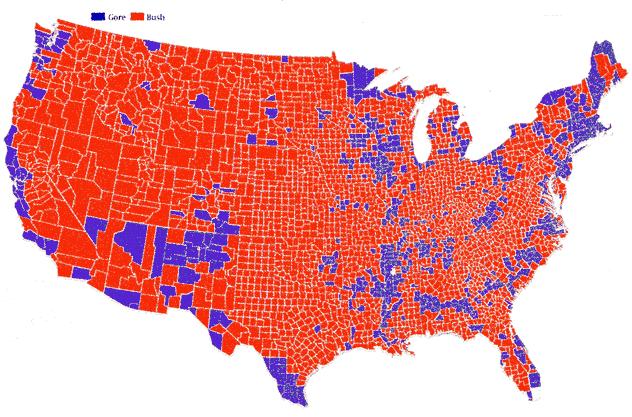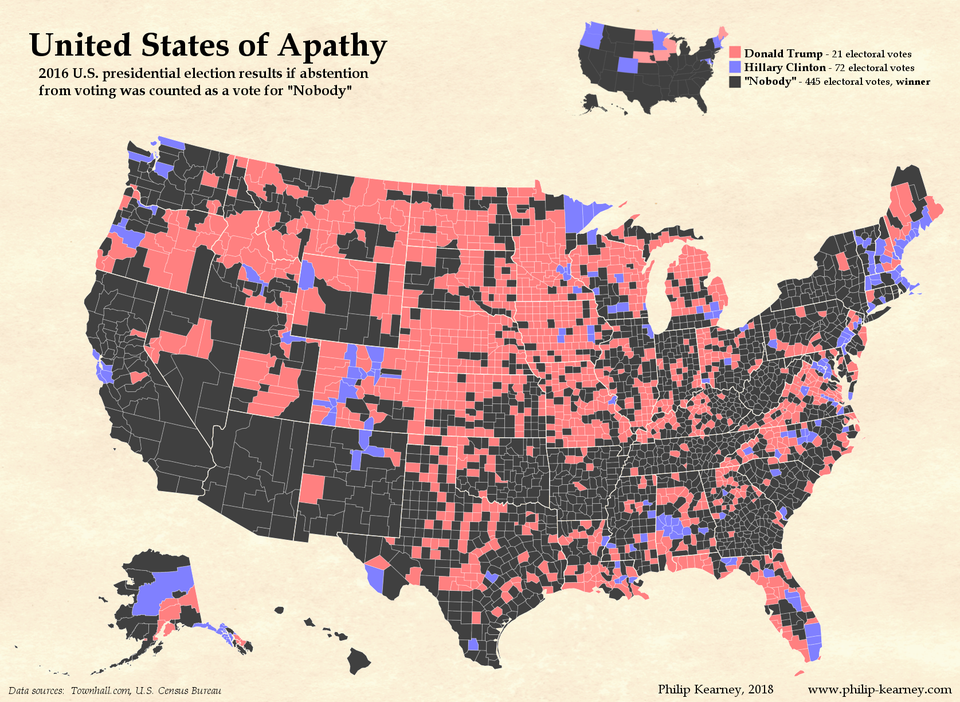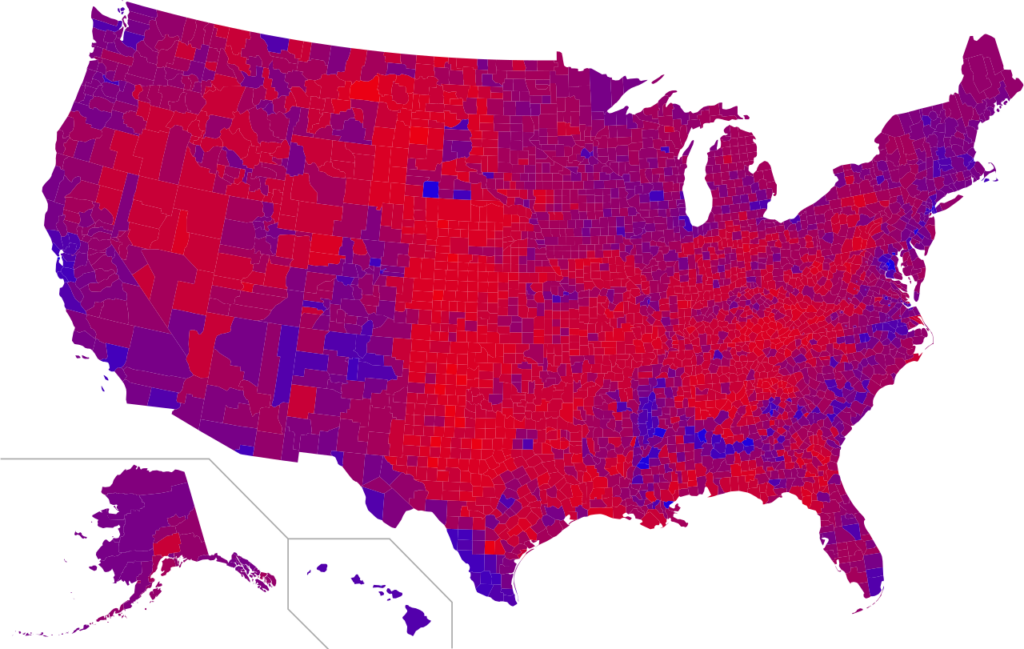An Emerging Values Consensus?
You might look at that title – “An Emerging Values Consensus” – and think, are you kidding?? The Culture Wars and the partisan divide between liberals and conservatives (or the blue zone and the red zone) have been a fixture in our society for decades now. I’ve already written a series of blog posts on the topic, in which I concluded that we were experiencing a “Red-Blue” identity crisis as a society. Which way will we break? Or could we even break into two – split into two societies altogether, possibly violently? There is serious discussion of impending civil war out there.

You’ve probably seen the above map before. It’s from the 2000 Presidential election, and shows the counties that voted for Bush in red and the counties that voted for Gore in blue. It’s around this time that the red zone-blue zone idea came about – the idea that there were two different “values camps” with competing visions of what America should be. Baby Boomers were in mid-life then, and their values-orientation dominated American culture. Their passion and moral zeal is what made the divide between the two camps so deep and so unbridgeable, damaging our political system to the point that many now wonder if it can be repaired. Just think of the events of January 6th this year to understand what I mean.
Back around that time, on an old fashioned web site that I built, I attempted to list out the differences between these two values camps. The list is a bit over-generalized, a bit stereotyped; I can’t deny it. I’m sure many people believe a little bit from column A, a little bit from column B. But to some extent these differences do define the partisan divide, and the thing is, as the partisanship has just worsened and worsened, it’s gotten to the point that it doesn’t really matter what your particular “nuanced” belief system is. The political struggle has become existential, and you have to pick a side and stick with it.
Or not, I suppose. You could just not belong to either side. I have a feeling that many of my generation, Generation X, are in that particular “values camp.” It’s the camp of people who mind their own business and just want to be left alone. As the map below show, if non-voters counted in the electoral college (I know, that makes no sense) then “Nobody” would have been elected President in 2016.
This isn’t to say that non-voters lack values or moral beliefs, just that they might be having trouble finding a political party to fit into. As I already suggested, most people probably take their beliefs a little from the red side, a little from the blue side. It’s even possible to show that the country isn’t so starkly divided geographically as the “red zone-blue zone” maps suggest, by measuring both Republican and Democratic votes per county and constructing a “purple” spectrum map like the one below.
All I’m trying to say here is that the neat division of values into two columns doesn’t necessarily reflect how people think. And now that Boomers are aging out of mid-life, being replaced by Generation X, moral righteousness as a guiding principal of politics is losing its shine. As I already blogged, Boomer moralism has rendered politics dysfunctional. Younger generations yearn for a practical approach to politics, one that can solve the many thorny problems facing our society. It is perhaps unfortunate, then, that the current mid-life generation, Generation X, which is known for pragmatism, also eschews politics.
I’m just rehashing what I’ve already written about before, so back to the title of this post and the idea of a values consensus. Assuming America is not going to split into two societies, we’re eventually going to settle for some version of “a little bit of column A, a little bit of column B” that works for the majority of us. This will grow more and more apparent as the morally righteous Boomers, who pretty much can’t ever have their minds changed, age out of public life. Those who disagree with these values, who reasonably can claim that there is no “consensus” since they disagree, will be relegated to the sidelines of public life. In fact, you can already see this happening. Isn’t that exactly what hashtag movements, cancel culture, de-platforming are all about? Effectively, if unfairly, enforcing a majoritarian viewpoint?
So what exactly is the consensus that is emerging? I actually tried to predict what it might be way back in 2002 when I first created the red values v. blue values page. Then I tried again and again around the time of the 2016 election. How exactly am I doing this? Well, my admittedly non-scientific approach is simply to monitor discourse on major platforms on the Internet to see what’s going on. I check the reddit hivemind, since I really do think that is the premier site where Millennials are forging a consensus using the tools of social media.
Now maybe this puts me in a bit of blue zone bubble, since all the red zoners are moving to alternate sites like Gab and Parler (so I’ve heard). But doesn’t the fact that red zoners are shifting to less mainstream platforms tell you which way the consensus is going? Honestly, I think there are only two areas where the red zone’s view still has traction, and that is in the two most contentious points of the Culture Wars – gun control and abortion rights.
So here’s where I think we end up:
- Pro-gun rights
- Pro-marijuana legalization
- Equal rights for LGBTQ
- “Counter-culture” mainstreamed (everyone has a tattoo these days)
- Pornography accepted
- Continued restrictions on abortion, though it will never be fully banned
- Justice and police reform
- Reform to improve the lot of lower economic classes, even if it’s “socialism”
- Pro-environmentalism policies to deal with climate change
- A path to citizenship for “dreamers,” but immigration otherwise limited
- Acceptance of a multicultural, multiracial, multi-religious society, to the chagrin of White Christian Nationalists
So now that this Culture Wars crap is out of the way, can we end the filibuster already and get some Universal Healthcare?


One thought on “An Emerging Values Consensus?”
I keep editing the final list based on feedback I am getting from where I have posted this, but the gist of the post remains the same.